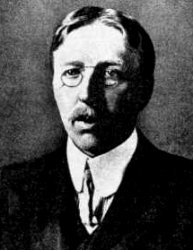

Queer Places:
80 Campden Hill Road, Kensington, London
Le
3 Quai du Parti, 83000 Toulon, France
 Ford Madox Ford (né Joseph Leopold Ford Hermann Madox Hueffer (/ˈhɛfər/ HEF-ər);[1] 17 December 1873 – 26 June 1939) was an English novelist, poet, critic and editor whose journals The English Review and The Transatlantic Review were instrumental in the development of early 20th-century English and American literature.
Ford is now remembered for his novels The Good Soldier (1915), the Parade's End tetralogy (1924–28) and The Fifth Queen trilogy (1906–08). The Good Soldier is frequently included among the great literature of the 20th century, including the Modern Library 100 Best Novels, The Observer′s "100 Greatest Novels of All Time", and The Guardian′s "1000 novels everyone must read".
Ford Madox Ford (né Joseph Leopold Ford Hermann Madox Hueffer (/ˈhɛfər/ HEF-ər);[1] 17 December 1873 – 26 June 1939) was an English novelist, poet, critic and editor whose journals The English Review and The Transatlantic Review were instrumental in the development of early 20th-century English and American literature.
Ford is now remembered for his novels The Good Soldier (1915), the Parade's End tetralogy (1924–28) and The Fifth Queen trilogy (1906–08). The Good Soldier is frequently included among the great literature of the 20th century, including the Modern Library 100 Best Novels, The Observer′s "100 Greatest Novels of All Time", and The Guardian′s "1000 novels everyone must read".
Ford was born in Wimbledon in London,[2] to Catherine Madox Brown and Francis Hueffer, the eldest of three; his brother was Oliver Madox Hueffer and his sister was Juliet Catherine Emma Hueffer, the wife of David Soskice and mother of Frank Soskice. Ford's father, who became music critic for The Times, was German and his mother English. His paternal grandfather Johann Hermann Hüffer was first to publish Westphalian poet and author Annette von Droste-Hülshoff. He was named after his maternal grandfather, the Pre-Raphaelite painter Ford Madox Brown, whose biography he would eventually write. His mother's older half-sister was Lucy Madox Brown, the wife of William Michael Rossetti and mother of Olivia Rossetti Agresti. In 1889, after the death of his father, Ford and Oliver went to live with their grandfather in London. Ford graduated from the University College School in London, but never attended university.[3]
In 1894, Ford eloped with his school girlfriend Elsie Martindale. The couple were married in Gloucester and moved to Bonnington. In 1901, they moved to Winchelsea.[3] They had two daughters, Christina (born 1897) and Katharine (born 1900).[4] Ford's neighbours in Winchelsea included the authors Henry James and H.G. Wells.[3] In 1904, Ford suffered an agoraphobic breakdown due to financial and marital problems. He went to Germany to spend time with family there and undergo cure treatments.[3] In 1909, Ford left his wife and set up home with English writer Isobel Violet Hunt, with whom he published the literary magazine The English Review. Ford's wife refused to divorce him and he attempted to become a German citizen in order to obtain a divorce in Germany. This was unsuccessful. A reference in an illustrated paper to Violet Hunt as "Mrs Ford Madox Hueffer" gave rise to a successful libel action being brought by Mrs Ford in 1913. Ford's relationship with Hunt did not survive the First World War.[5] Ford used the name of Ford Madox Hueffer, but he changed it to Ford Madox Ford after World War I[6] in 1919 because "Hueffer" sounded too Germanic. Between 1918 and 1927, he lived with Stella Bowen, an Australian artist 20 years his junior. In 1920, Ford and Bowen had a daughter, Julia Madox Ford.[7] In the summer of 1927, The New York Times reported that Ford had converted a mill building in Avignon, France into a home and workshop that he called "Le Vieux Moulin". The article implied that Ford was reunited with his wife at this point.[8]
"Oscar Wilde I can never forgive. You may maintain that he had a right to live his own life and, for the sake of sheer vanity, get himself into Reading Gaol. For there was no reason for his going to prison and the last thing that the British authorities wanted to do was to put him there." So wrote Ford Madox Ford in a 1930 essay called ‘The Death of English Poetry’.
In the early 1930s Ford established a relationship with Janice Biala, a Polish-born artist from New York, who illustrated several of Ford's later books.[9] This relationship lasted until the late 1930s. Ford spent the last years of his life teaching at Olivet College in Olivet, Michigan. He was taken ill in Honfleur, France in June 1939 and died shortly afterwards in Deauville at the age of 65.
My published books: